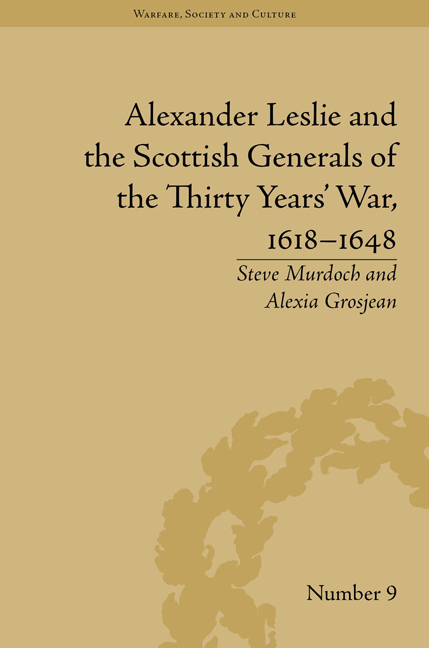Book contents
- Frontmatter
- CONTENTS
- Dedication
- Acknowledgements
- Abbreviations
- Stylistic Conventions
- Introduction
- 1 Scotland's Indigenous Military Cultures
- 2 The Scottish Military Diaspora
- 3 The Thirty Years' War Campaigns: Stralsund to Prague, 1628–35
- 4 Alexander Leslie and the Army of the Weser, 1635–9
- 5 The Home Front: Leslie, Ruthven and the Bishops' Wars, 1638–41
- 6 The Scottish ‘Veteran Generals’ in England, 1642–7
- 7 Going Full Circle: The New Scottish Command in Europe, 1639–48
- Conclusion
- Appendix
- Notes
- Works Cited
- Index
4 - Alexander Leslie and the Army of the Weser, 1635–9
- Frontmatter
- CONTENTS
- Dedication
- Acknowledgements
- Abbreviations
- Stylistic Conventions
- Introduction
- 1 Scotland's Indigenous Military Cultures
- 2 The Scottish Military Diaspora
- 3 The Thirty Years' War Campaigns: Stralsund to Prague, 1628–35
- 4 Alexander Leslie and the Army of the Weser, 1635–9
- 5 The Home Front: Leslie, Ruthven and the Bishops' Wars, 1638–41
- 6 The Scottish ‘Veteran Generals’ in England, 1642–7
- 7 Going Full Circle: The New Scottish Command in Europe, 1639–48
- Conclusion
- Appendix
- Notes
- Works Cited
- Index
Summary
Ich [Axel Oxenstierna] hab auch den herrn general majeur Alexander Leslie zum veldtmareschall declarirt undt ihm miteiner guten ahnzahl dapfern alten fuessvolcks naher Westphalen verordtnet
As discussed in the previous chapter, in the aftermath of the battle of Nödlingen (1634) and the Treaty of Prague (1635) it appeared to most European powers that the forces of the Holy Roman Empire had delivered a decisive blow against the Swedes and their allies. Ferdinand believed that he had finally gained the upper hand against the various powers opposed to Habsburg hegemony. The Prague settlement led to the mass departure of former Swedish allies, most notably Elector Johan Georg of Saxony but soon followed by Duke Georg of Braunschweig-Lüneburg, resulting in the removal of at least six generals and several prominent colonels from pro-Swedish forces. Colonel William Vavasour, an English veteran, stated emphatically that Lüneburg's defection left him stranded in enemy territory and in great danger. Wounded, he was forced to retire to London and leave his remaining 300 men with colleagues; the English soldiers of his company were sent to the Scottish Colonel James Lumsden in Osnabrück, while the Germans were sent to Vavasour's countryman, Colonel Arthur Aston, in Nienburg. Other allies vacillated. When Landgrave Wilhelm of Hessen-Kassel provisionally accepted the treaty in November, Axel Oxenstierna was prompted to order Lieutenant General Peter Melander to prevent any demobilizing Hessen troops from joining the Imperialists.
- Type
- Chapter
- Information
- Publisher: Pickering & ChattoFirst published in: 2014

